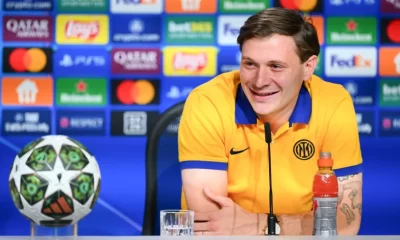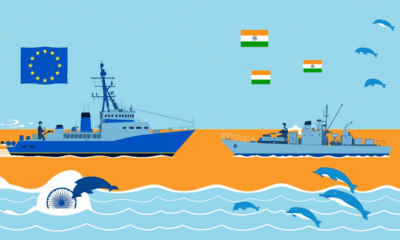Politics
Shepherds and believers under the yoke of communism (2)

By Archpriest George Mitrofanov
However, the part of the Russian church hierarchy that was abroad since 1921 decided to take the mission to act on behalf of the Russian Orthodox Church freely and openly, primarily on political issues. And from this point of view, it can be stated that since the beginning of the 1920s the position of the Russian Orthodox Church regarding the struggle against Bolshevism (the position that was originally formulated in Russia at the local cathedral) began to be voiced, however, acquiring some kind of originality, in the official documents of the foreign church hierarchy. It is significant that in Russia, even in the conditions of a very strict controversy, which was conducted with Metropolitan Sergius by such opposition as, for example, Metropolitan Cyril (Smirnov) or even Metropolitan Joseph (Petrov), such political issues were practically not discussed. The main attention in this polemic was focused on criticizing the actions of Metropolitan Sergius, primarily from the canonical and ecclesiological points of view. For both Metropolitan Sergius and his opponents, it was obvious that there was no mass, organized resistance to Bolshevism in Russia.
Another in relation to the continuation of the struggle against Bolshevism was the position of Russian abroad, just like the position of the Russian Orthodox Church abroad. The initial plan of evacuation from the Crimea of the army of General P.N. Wrangel, and it was about the evacuation of almost 70,000 military personnel, in addition to almost the same number of refugees, came down to maintaining the army for the speedy resumption of the civil war with the Bolsheviks. General Wrangel hoped for mass people’s uprisings, which would allow the struggle preserved in the conditions of the Russian Army. Sending the greeting of the Cathedral in Sremski Karlovtsy, General Wrangel acted as a recognized leader of Russian white emigration, for whom the opinion of the church cathedral on political issues was very significant. The judgments of the Cathedral on political issues could be laid the thesis of the exposure of the false teaching of socialism, which was made up of the Bishop of Sevastopol Benjamin (Fedchenkov), then occupied the position of extreme anti -communism. And the important thing is that in these theses there was a very consistent, continuing in spirit anathema of the Local Council, the rejection of Bolshevism as a pseudo -religious false teaching.
“The Russian foreign church assembly considers it necessary to condemn the false education of socialism and its most consistent form-Bolshevism. And communism, as the doctrine of anti-Christian at the base and destructive in its consequences. First of all, from the point of view of religious and moral, because socialism destroys all life, especially Christian, socialism destroys the foundations of morality and leads to complete lawlessness and between Christianity and between Christianity and between Christianity and between Christianity and between Christianity and between Christianity and Socialism is a complete contradiction with a superficial, imaginary similarity. ” As measures of the struggle against socialist false teaching, measures were proposed by a rather consistent and diverse struggle against Bolshevism. But, perhaps, more important for Russian political emigration, which at that time concentrated in its hands all the main threads of the struggle with Bolshevism, was the message of the Synod of the Russian Orthodox Church abroad in February 1922 of the Genoese conference. This message is very lengthy, in some ways very uneven, amazes with its consonance with the plans of that part of the Russian emigration, which at that time focused on General Wrangel, on the possibility of an early continuation of the armed struggle with Bolshevism with the help of Western Europe.
“The peoples of Europe, the peoples of the world! Plate our good, open, noble people Russian, who fell into the hands of world villains! Do not support them, do not strengthen them against your children and grandchildren, but better help honest Russian citizens, give them their volunteers and help them to expel the Bolsheviks, this cult of murder, robbery and blasphemy from Russia and the whole world. Pity the poor Russian refugees who are doomed to hunger and sweat for your patriotic feat, to the most difficult works that are forced to forget everything that they have studied and even deprived of such necessary life amenities that are available to the last illiterate black worker. Help them from the chain of shameful slavery of the robbers. If you help to recover historical Russia, then the insoluble political and economic difficulties that have made life so difficult around the world will soon disappear. Then the world desired for everyone will descend to Earth. ”
However, over time, the fate of the army of General Wrangel developed very unfavorable. The army moved to Bulgaria, and then to Serbia, was ultimately disbanded by the order of Wrangel of September 1, 1924, which at the same time laid the foundation for the creation of the Russian All -Military Union. General Wrangel and his closest environment were no longer counted on the possibility of a mass people’s uprising, which would allow the White Army to invade the territory of Russia and become the main shock force of this uprising. The possibility of another option was assumed that, if the aggressive policy of the Soviet Union, aimed at provoking the world revolution, led him to a conflict with some European countries, the Russian army stored in the structure of Rovs could quickly form and serve the core of the future Russian army, which in alliance with the Western countries would resume the war with the Bolsheviks.
It should be emphasized that the priesthood of the Russian Orthodox Church abroad responded to what happened in Paris from April 4 to 11, 1926. The All -Zabobelny Congress, which was attended by 450 delegates from 200 organizations. This congress was really the most massive forum of Russian political emigration, which developed a position acceptable for so many directions of Russian political emigration – from monarchists to patriotic socialists. The Grand Duke Nikolai Nikolaevich was nominated at the congress as a leader of Russian emigration, who continued to hope for the possibility of continuing already under his leadership of the armed struggle with the Bolsheviks, but in conditions when there was no massive speech in Russia. The priesthood of the Russian Orthodox Church abroad supported this congress as consolidating the political forces of Russian emigration.
However, there was time, and hopes for the resumption of the armed struggle with the Bolsheviks gradually melted, in any case, among the older generation of Russian emigration. The story with the “Trust”, when the attempt is primarily General A.P. Kutepov to go to some kind of anti-Soviet underground, possibly existing in Russia, turned out to be unsuccessful-for almost five years his representatives, operating in Soviet Russia, were essentially in the hands of the GPU. She showed that all the efforts of the underground work of Russian military emigration could not have been in vain of the underground work. It was then that a series of terrorist acts in 1927-1928 followed as a kind of act of political despair of Russian military emigration. In Leningrad and Moscow, which were carried out by Kutepov officers. However, many emigration figures did not see the prospects in such terrorist acts and considered them as a kind of attempts to support General Kutepov officers to support his sharply shaken authority.
However, even at that time, outside the field of vision of the priesthood of the Russian Orthodox Church abroad, there were no attempts to Russian emigration, even sometimes an adventurous way to continue the military struggle against the Bolsheviks. The moral pathos of this struggle, due to the inability of Russian emigration to believe that the Russian people have so easily reconciled with Bolshevism, and the hope that some terrorist acts will raise mass resistance, sometimes found an echo in the soul of even such authoritative church hierarchs as Mitropolitan Anthony (Khrapovitsky). So, for example, his message, written in 1930, had his addressee “The Brotherhood of the Russian Pravda” – one of the underground military organizations, created under the leadership of General P.N. Krasnov. Having created the “Brotherhood of Russian Pravda”, General Krasnov hoped to organize partisan detachments in Soviet Russia, which were supposed to fight the Bolshevism armed route.
Turning to emigrants who are ready to illegally go to Russia to continue the armed struggle, Metropolitan Anthony wrote: “Orthodox Christians! There is a lot of this Antichrist Red power tormenting the Motherland, Great Russia, trying to burn, like a hot iron, from the Russian people to turn it to its submissive herd. From the very beginning. The robbery gang did not stop persecution against faith over Russia … Seeing this terrible sight and hearing about these still unprecedented persecutions, the religious conscience of the whole world woke up: in all countries, the highest representatives of all kinds of religions, starting with the pope, the head of the Catholics of the whole world, and ending not even Christian religions, elevate their voice against the red persecutions of the Red Beers to the faith. And they urge their flocks to pray for the deliverance of the Russian people … If those who are more captured by threats and impotence are more likely to act before God and conscience. The Russian people are Orthodox Christians! Get up all against the red antichrist, do not listen to anyone to reconcile with him, from whom these calls come … by the authorities given to me from God, I bless all weapons, against the red Satanic power, and I let all the sins in the ranks of the rebel combat and the lonely people’s avenge will put their heads for the Russian and Christ. ”
The Brotherhood of the Russian Truth could not deploy a wide partisan movement in Soviet Russia. But, nevertheless, the readiness of the priesthood to support even this undertaking indicated that from the point of view of the Synod of the Russian Orthodox Church abroad, the continuation of the armed struggle with the Bolsheviks was not only possible, but also necessary. The appeals of Metropolitan Anthony, who are not inclined, as we know, especially appeal to Western Christianity, and to the Pope, and even to not Christian religions due to the persecution of the Bolsheviks to the Church. The topic of appeal to world public opinion, so that it intervenes in the events taking place in Russia, begins to sound in the speeches of the Russian Orthodox Church Hierarchy more and more distinctly.
The abduction of General Kutepov in 1930, which was sufficiently disorganized by ROVS and undermined the authority of the older generation of Russian emigration in the eyes of the young generation, led to a qualitative change in the anti -Bolshevik struggle of Russian emigration. It was at this time that the National Labor Union of a new generation was created, the future NTS, in which only young people were accepted and who began to carry out their activities according to other principles, realizing that one cannot strive only for the restoration of the former system in Russia. Using the colossal experience of the political life of Western Europe, which developed very dynamically at that time, young representatives of Russian emigration (only people were not older than 1895 were accepted in the NTS) to create a massive, but at the same time, a well -conspiracy party that could rely not on the blurry non-focused ideology of the ROVS, but on a very definite, corresponding to the requirements of the modern political political Life is an ideology that can help the restoration of a full -fledged economic, political and cultural life in Russia. NTS never intervened in church conflicts that arose in the Russian foreign country, NTS members belonged to both Carlovatskaya and Elogian jurisdiction. It should be emphasized that both the Holy Principle of both the Russian Orthodox Church abroad and Metropolitan Evlogiy (Georgievsky) never tried in one way or another to formulate their attitude to the activities of this particular organization, although its ideas could not but cause the Russian church hierarchy to sometimes cause it.
The 30s led many politically active figures of Russian emigration to understand that there was no longer to wait for any mass people’s uprising in the Soviet Union. It was at this time that the tendency to intensify the possibility of renewing the struggle with the Bolsheviks after the warfare of the Soviet Union with some external opponents. The experience of Spain, when Germany and Italy helped General Franco save the country from Bolshevism, instilled hope even for the possibility of the war of Germany and the Soviet Union. However, the leadership of the Russian Orthodox Church abroad refrained from any official statements about this. In this regard, one should dwell on the gratitude address often mentioned for polemical purposes on behalf of the Bishop Synod of the Russian Orthodox Church abroad. The emergence of this kind of a truly unique Synod for the bishop (from the point of view of expressing his political loyalty to the head of a foreign state) the address was caused by quite definite reasons associated with the transfer of the Russian Church of the Cathedral in Berlin. And, probably, it cannot be considered as an act of unconditional recognition of the Russian Orthodox Church Hitler as the only leader of the political front that developed at that time against the USSR. It is no accident that the relations of the Russian Orthodox Church abroad with the Nazi regime were difficult to form quite difficult: the latter in political terms never trusted the Russian Orthodox Church abroad.
The Second World War that began with the attack of Germany and the USSR on Poland, which received its continuation in the German attack on the USSR, caused an ambiguous reaction of the Russian, including church, emigration. Russian emigration was split in the question of the possibility of cooperation with Germany in its war against the Soviet Union. In this regard, a document is indicative, which was not based on the pen of the Russian Orthodox Church abroad, which at that time took a restrained loyal position in relation to the fascist regime in Germany, and the representative of the Western European exarchate of the Ecumenical Patriarchate of Metropolitan Evogy, among whose flocks, anti-fascist sentiments were very widespread.
Speaking in the newspaper New Word in Germany on June 29, 1941, regarding the attack of Germany on the Soviet Union, Archimandrite John (Shakhovskaya) wrote: “The Providence saves the Russians from the new civil war, urging the Earth to fulfill its destiny. The right to survive the overthrow of the 3rd International is entrusted to the skillful, experienced in science of his German surgeon. To lie down under his science. The surgical knife is not shameful. Christian faith and culture. It took a professional, military, experienced in the most critical battles the iron -right hand of the German army. She is now instructed to knock down red stars from the walls of the Russian Kremlin, she will hang them if the Russian people do not bring them themselves. The new page of Russian history opened on June 22, 1941, on the day of the celebration by the Russian Church in memory of all saints, in the land of the Russian shone. Is it not clear even for the blind a sign that the highest will is led by events. In this purely Russian and only Russian holiday, connected to the Day of Resurrection, the disappearance of the demon cries of the International from the Russian Earth began. ”So the archimandrite John (Shakhovskaya), like many of his contemporaries, who loved his torn by the Bolsheviks, wrote very critically and hoping in despair that the war with Germany will help to get rid of the Russian people from communist slavery.
However, in the official documents of the Russian Orthodox Church abroad or the Western European Exarchate and Metropolitan Evogy, it is impossible to discover such unconditional calls to support the attack of Germany on the USSR throughout the war. Moreover, even the private performances of Russian foreign church hierarchs will continue to become more restrained the more obvious during the Second World War the anti -Russian and anti -Christian policy of fascist Germany in the occupied territories, which will use the revival of Russian church life only for its propaganda purposes.
Much more important, in my opinion, is a different aspect of the anti -Bolshevik position of the Russian Orthodox Church abroad during the Second World War. Throughout the war period, the first Russian emigration, and then the representatives of the Red Army, who took the anti -communist position, made unsuccessful attempts to form anti -communist armed forces on the rights of allied relations with the German army. Despite the fact that over the years of the war, more than a million Soviet citizens took the side of Germany, no such Russian army until 1944 arose. When in November 1944 the formation of the Committee for the Liberation of the Peoples of Russia and the ROA finally turned into its armed forces (the committee had the status of an independent anti -communist Russian government with its armed forces), the Russian Orthodox Church abroad consistently supported this undertaking. The relations of old emigrants and former red commanders took shape very seriously when they found themselves together in the conditions of war. White emigrants shocked in former red commanders an almost animal hatred of the Bolsheviks, their willingness to destroy Bolshevism with the most cruel methods. The former red commanders were struck in the emigrants the desire to fight the Bolsheviks using the principles of traditional Russian military ethics.
Indeed, the terrible experience of the quarterless domination of the Bolsheviks in Russia made many Russian people understand the truly satanic nature of Bolshevism, and the emigrants did not fully realize this, recalling only somewhat romanticized civil war. At the same time, the new Soviet mentality also affected here: white emigrants could not have hated anyone so frantically. For them, Bolshevism was primarily a military-political opponent, and not a beast-like satanic force, which he appeared during the previous years before many Soviet people. Nevertheless, despite the fact that former Soviet citizens played a decisive role in the Committee for the Liberation of the Peoples of Russia, the Russian Orthodox Church abroad represented by Metropolitan Anastasia (Gribanovsky) supported its creation.
In his sermon on a prayer service on the giving victory by the Armed Forces of the Committee for the Liberation of the Peoples of Russia on November 19, 1944, Metropolitan Anastasius described the incident as follows: “We are now connected by all one feeling – deadly intransigence to the Bolshevik spirit and a fiery desire to eradicate it on Russian land. For we know that until it reigns there, there is no reason. Reasonable human life, no spiritual advancement, while this is threatening both our Fatherland and all of Europe, death and destruction will be approved everywhere. Create a genuine patriotic, even more than that, the world, and the church cannot but bless your great and holy undertaking. Dear brothers and sisters, we will unite around our national liberation movement, everyone will be on their way and promote the general great work of the liberation of our Russia until this terrible evil of Bolshevism is falling until our exhausted Russia is rebelled. ”
The position of Metropolitan Anastasia demanded great courage from him, for the political platform of CONR, emanating from the “February” principles, remained largely unacceptable for that part traditionally, often right -minutely thinking of the old Russian emigration, which supported the foreign synod. However, the “February” manifesto of CONR, nevertheless, did not prevent Metropolitan Anastasia from seeing the main thing – the creation of the anti -communist Russian government in 1944, which was first able to unite under its banners the widest front of Russian anti -communists and which had its armed forces and on allied principles built its relations with fascist Germany.
Subsequent events took shape in such a way that General A.A. Vlasova did not receive further development, and the Russian Orthodox Church abroad had to mainly act as a defender of those more than two million Soviet citizens whom the Western allies had to deport in the USSR in accordance with the Yalta agreement. The defeat of fascist Germany made it impossible for the further existence of the Armed Forces of Conrah. The Western allies chose to go to an ambiguous world with the Soviet Union, giving communism a significant part of Europe, and did not support the mass anti -communist movement that arose under the war, which could put under the banner of the Conr of hundreds of thousands of Soviet prisoners of war.
[1945putacertainmilestoneinthehistoryoftheRussiananti-communistmovementafterwhichitnotonlystoppedasamassiveandarmedmovementbutalsopassedintoacompletelydifferentstageTheanti-SovietmovementintheSovietUnionacquiredacompletelydifferentcharacternotonlyinitsformsandscalebutaboveallinitsfocusThepatrioticOrthodoxtopichasalreadyceasedtobedominantinthedissidentmovementoftheSovietUnionthepositionoftheOrthodoxChurchceasedtobesosignificantfordissidentsofthe1960-1980sThatiswhy1945whichmarkedthebeginningofanewstageinthehistoryoftheanti-communistmovementalsobelievesthechronologicallimitofthetopicunderconsideration
Summing up some results of the foregoing, I would like to note the following. In the period from 1917 to 1945, the Russian Orthodox Church first with the lips of St. Patriarch Tikhon and members of the Local Council of 1917-1918, and then a fairly consistent position of the Russian Orthodox Church abroad managed to give all Russian Orthodox Christians a clear understanding of the spiritual essence of Bolshevism. Having the opportunity, in conditions of relative freedom, to carry out their activities and feeling itself as a successor of the traditions of the political life that were characteristic of Russia of the Dopolshevik period, the Russian Orthodox Church abroad tried to use all the opportunities that had been available to it in order to continue the specific practical struggle with the Bolsheviks. This was a very important moral-historical task that the Russian Orthodox Church abroad solved. For Russia, the fact that its position was largely unable to realize in reality, not the fault of the Russian Orthodox Church abroad, but rather the trouble of our people, who for a long time did not find internal forces to overcome communism.
The experience of the Russian Orthodox Church abroad in terms of its upbringing among Russian Orthodox Christians is very important for the difficult time we have experienced now. For it was precisely in our time in the Russian Orthodox Church that a phenomenon as communal patriotism, in which incompatible (especially this is clear after what happened in the 20th century), the God-finding communism and the Russian patriotism so closely connected with Orthodoxy manage to get used to a bizarre image of a post-Soviet man. This strange symbiosis exists, and it cannot but disturb!
That is why the position of the Russian Orthodox Church abroad in relation to communism is a consistent, spiritually and historically sober, deeply formulated and theological meaningful (and, most importantly, pastorally introduced into the life of several generations of Russian Orthodox Christians) – it is today extremely necessary for us, those who have been a whole soul for a country that still has not become an Orthodox national Russia, but remains post -communist Russia, where the rudiments of the Soviet consciousness sometimes manifest themselves even in church life.
Source in Russian: Mitrofanov George, prot. Shepherds and believers under the yoke of communism. – In: Citizen, No. 5, 2003, p. 63-69.
Politics
EU changes protection status of wolves in Europe

DISCLAIMER OPINIONS: The opinions of the authors or reproduced in the articles are the ones of those stating them and it is their own responsibility. Should you find any incorrections you can always contact the newsdesk to seek a correction or right of replay.
DISCLAIMER TRANSLATIONS: All articles in this site are published in English. The translated versions are done through an automated process known as neural translations. If in doubt, always refer to the original article. Thank you for understanding.
DISCLAIMER PHOTOS: We mostly used photos images that are readily available online, from free sources, or from the people promoting the news. If by any chance it happens that we have used one of your copyrighted photos, please do not hesitate to contact us and we will take it down without question. We do not make profits as this is a not for profit project to give voice to the voiceless while giving them a platform to be informed also of general news, and it is completely free.
Politics
Commission adopts Ocean Pact to protect marine life and strengthen blue economy



DISCLAIMER: Information and opinions reproduced in the articles are the ones of those stating them and it is their own responsibility. Publication in The European Times does not automatically means endorsement of the view, but the right to express it.
DISCLAIMER TRANSLATIONS: All articles in this site are published in English. The translated versions are done through an automated process known as neural translations. If in doubt, always refer to the original article. Thank you for understanding.

– Advertisement –
– Advertisement –
The ocean shapes our economies, our food systems, even the air we breathe. To better protect our ocean, the Commission has adopted a European Ocean Pact, which will help to promote a thriving blue economy and support the well-being of people living in coastal areas.
This Ocean Pact brings together EU ocean policies under one single and coordinated framework. It will do so through a collaborative approach between EU countries, regions, and stakeholders, including fishers, innovators, investors, scientists, and civil society. Six priority areas for action will define this work, namely
- protecting and restoring ocean health by supporting EU countries in their efforts to restore degraded coastal marine habitats
- boosting the competitiveness of the EU sustainable blue economy including by strengthening the EU’s maritime industry and by introducing a Blue Generational Renewal Strategy, to foster access to young professionals in marine research, ocean tech, and sustainable fisheries
- supporting coastal and island communities, and outermost regions by presenting new or updated strategies for these regions and communities
- enhancing maritime security and defence by strengthening EU coast guard cooperation and maritime border security
- advancing ocean research, knowledge, skills and innovation by proposing an ambitious EU Ocean Observation Initiative
- strengthening EU ocean diplomacy and international ocean governance by stepping up its fight against illegal, unreported and unregulated fishing
The European Ocean Pact will be complemented by an ocean act by 2027, which will help to ensure the implementation of the priorities of the pact. An EU Ocean Pact dashboard will be used to track progress.
For more information
Press release: Commission adopts European Ocean Pact for a healthy ocean, a competitive blue economy and thriving coastal communities
More information about the European Ocean Pact
Source link
More from the author
– EXCLUSIVE CONTENT –
Politics
The European Union and the Republic of Moldova confirm their strong partnership at the 9th EU-Moldova Association Council meeting


© FRVS+MPCP 2022. The European Times® News is registered as an EU Trademark. All rights reserved. The European Times® and the logo of The European Times® are EU trademarks registered by FRVS+MPCP.
Members/Partners of

About Us
Popular Category
DISCLAIMER OPINIONS: The opinions of the authors or reproduced in the articles are the ones of those stating them and it is their own responsibility. Should you find any incorrections you can always contact the newsdesk to seek a correction or right of replay.
DISCLAIMER TRANSLATIONS: All articles in this site are published in English. The translated versions are done through an automated process known as neural translations. If in doubt, always refer to the original article. Thank you for understanding.
DISCLAIMER PHOTOS: We mostly used photos images that are readily available online, from free sources, or from the people promoting the news. If by any chance it happens that we have used one of your copyrighted photos, please do not hesitate to contact us and we will take it down without question. We do not make profits as this is a not for profit project to give voice to the voiceless while giving them a platform to be informed also of general news, and it is completely free.
Editor Picks
-
EU & the World5 days ago
Aurora Borealis Forecast: Where & When to See the Northern Lights Tonight
-

 Sports6 days ago
Sports6 days agoChampions League Final 2024-2025: PSG-Inter, official lineups
-

 Sports7 days ago
Sports7 days agoPSG-Inter, Nicolò Barella jokes about Gianluigi Donnarumma
-

 EU & the World6 days ago
EU & the World6 days agoRihanna’s Parents: About Her Late Dad Ronald Fenty & Mom Monica Braithwaite
-

 Politics7 days ago
Politics7 days agoEU and India Forge Deeper Maritime Ties with Historic Joint Naval Exercise in the Indian Ocean
-

 Sports7 days ago
Sports7 days agoPSG-Inter, Lautaro Martinez unveils recipe for finals
-

 EU & the World6 days ago
EU & the World6 days agoLoretta Swit’s Net Worth: How Much Money the ‘M*A*S*H’ Alum Had
-

 Sports5 days ago
Sports5 days agoOfficial: Damien Comolli new general manager of Juventus.








